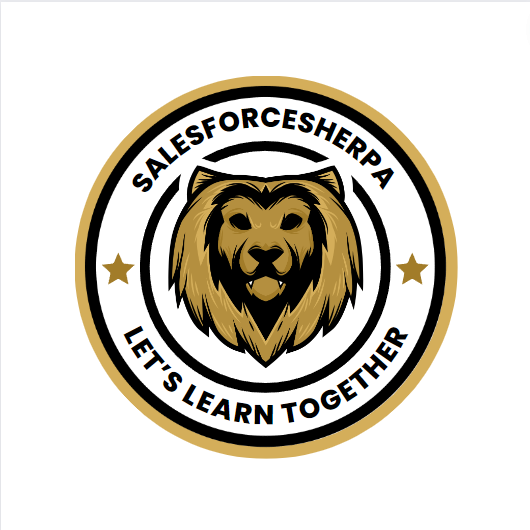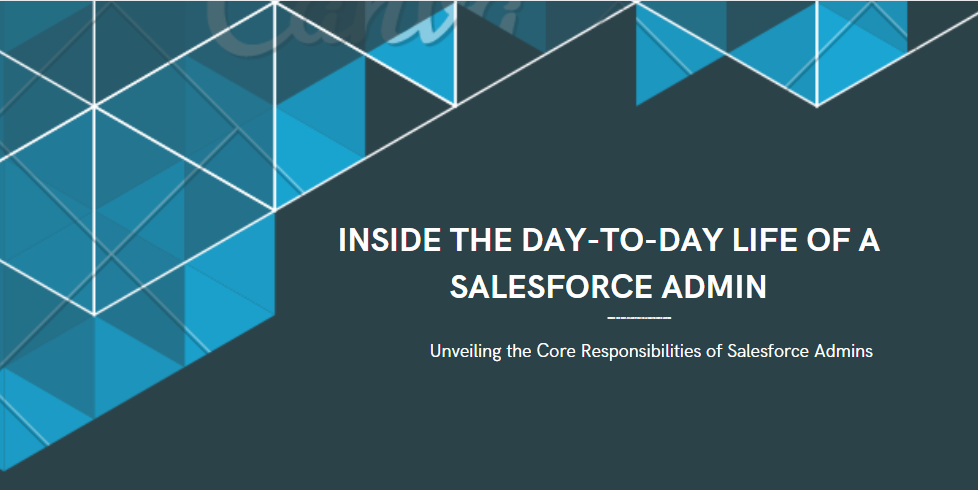Inside the Day-to-Day Life of a Salesforce Admin
 SalesforceSherpa
SalesforceSherpa
In today's fast-paced business world, customer relationship management (CRM) systems have become a cornerstone for organizations to efficiently manage their customer data and interactions. Among the various CRM platforms available, Salesforce stands out as one of the most popular and widely adopted solutions. Behind the smooth functioning of Salesforce lies the expertise and dedication of Salesforce Administrators, also known as Salesforce Admins. In this comprehensive article, we will delve deep into the day-to-day life of a Salesforce Admin, exploring their crucial roles, responsibilities, the challenges they face, and the importance of their contribution to organizational success.
What is a Salesforce Admin?
A Salesforce Administrator is a skilled professional responsible for the setup, configuration, and maintenance of the Salesforce platform to meet the unique needs of an organization. They act as the primary point of contact for all Salesforce-related tasks within the company, serving as the bridge between the technical aspects of the platform and the business processes it supports. Salesforce Admins play a critical role in ensuring the platform's seamless operation, empowering other employees to focus on their core tasks and maximizing productivity.
Roles and Responsibilities
1. User Management
At the core of every Salesforce Admin's responsibilities lies user management. They are tasked with creating and managing user accounts, roles, and profiles. Admins carefully control user access and permissions, ensuring that each employee has appropriate levels of access to data and features based on their roles within the organization. This step is crucial for maintaining data security and confidentiality.
2. Data Maintenance
Data is the lifeblood of any CRM system, and Salesforce Admins are entrusted with its maintenance. They handle data imports, exports, and updates to keep the system up-to-date and accurate. Regular data cleanup procedures are performed to eliminate duplicate records and ensure data integrity, providing a solid foundation for the organization's decision-making processes.
3. Customization and Configuration
Each organization has its unique business processes, and Salesforce Admins play a pivotal role in customizing and configuring the platform to align with these processes. They create custom fields, workflows, and process automation to streamline operations, resulting in increased efficiency and productivity for the entire organization.
4. Integration
Modern business environments are characterized by a diverse array of software applications, and Salesforce is rarely used in isolation. Salesforce Admins work on integrating the platform with other business applications to enable seamless data flow and process automation across different systems. This integration ensures that data remains consistent and readily accessible throughout the organization.
5. Troubleshooting
Even with careful planning and implementation, issues and challenges may arise in the Salesforce platform. When this happens, Salesforce Admins step in as the go-to experts to investigate and troubleshoot problems and errors. Their ability to identify and resolve issues swiftly is crucial for minimizing downtime and ensuring smooth operations.
A Typical Day in the Life of a Salesforce Admin
1. Morning Routine
A Salesforce Admin typically starts their day by checking emails and notifications for any critical updates or issues that need immediate attention. They prioritize tasks based on urgency and importance, preparing themselves for the day ahead.
2. Checking Dashboards and Reports
One of the essential tasks for a Salesforce Admin is reviewing the performance metrics, dashboards, and reports generated by Salesforce. This step allows them to gauge the overall health of the system and identify areas that require attention or improvement. By analyzing data trends and patterns, Admins gain valuable insights into the organization's performance.
3. Handling User Requests
Throughout the day, Salesforce Admins receive requests from various departments or users seeking assistance with different aspects of the platform. These requests can range from user access issues to complex customization requests. Admins carefully prioritize these requests and address them promptly, providing effective solutions to end-users.
4. Data Analysis and Cleanup
Data management is a continuous process, and Salesforce Admins dedicate time each day to analyze data trends, identify discrepancies, and perform data cleanup activities. By proactively maintaining data quality, Admins ensure that the information stored in Salesforce remains accurate and reliable.
5. Meeting with Stakeholders
Salesforce Admins collaborate with stakeholders from various departments, including sales, marketing, and customer support teams. These meetings provide valuable insights into the unique requirements of each department and help Admins suggest ways to optimize processes using Salesforce. Understanding the needs of stakeholders is essential for tailoring the platform to suit the organization's overall goals.
6. Continuous Learning and Professional Development
As the Salesforce platform evolves with updates and new features, Salesforce Admins proactively invest time in continuous learning and professional development. They participate in online courses, attend webinars, and obtain Salesforce certifications to stay up-to-date with the latest trends and enhancements. This commitment to ongoing learning ensures that Admins can leverage the full potential of Salesforce to benefit their organization.
Challenges and Rewards
The role of a Salesforce Admin comes with its fair share of challenges and rewards. Some of the common challenges include managing data quality, handling complex customization requests, and troubleshooting unexpected issues. Salesforce Admins must be skilled at multitasking and staying calm under pressure to overcome these challenges.
However, the rewards of being a Salesforce Admin are numerous. They witness the direct impact of their efforts on the organization's efficiency, customer satisfaction, and overall success. The satisfaction of creating streamlined processes, enabling data-driven decisions, and witnessing the platform's positive transformation drives Salesforce Admins to excel in their roles.
Importance of Salesforce Admins in Organizations
Salesforce Admins play a critical role in shaping the success of an organization. By meticulously configuring the Salesforce platform to meet specific business needs, they empower teams to collaborate effectively, make data-driven decisions, and deliver exceptional customer experiences. Their efforts contribute to enhanced productivity, reduced operational costs, and improved overall performance.
Conclusion
Salesforce Admins are the unsung heroes behind the scenes of every successful Salesforce implementation. Their dedication, expertise, and problem-solving abilities make them indispensable assets to organizations using the platform. As technology continues to evolve, the role of Salesforce Admins will only grow in significance. By embracing continuous learning and staying updated with the latest Salesforce trends, these professionals will continue to shape the future of customer relationship management.
FAQs
What qualifications are required to become a Salesforce Admin? To become a Salesforce Admin, one should have a strong understanding of Salesforce concepts and functionalities. While formal Salesforce training and certification are beneficial, practical experience and hands-on knowledge are equally essential.
Is coding knowledge necessary for a Salesforce Admin role? While coding knowledge is not a mandatory requirement for all Salesforce Admin roles, having a basic understanding of programming languages like Apex and JavaScript can be advantageous. Coding expertise enables Admins to handle more complex customization and integration tasks effectively.
How can Salesforce Admins handle user resistance to CRM adoption? User resistance to CRM adoption is not uncommon, and Salesforce Admins can address it through effective change management strategies. Admins should focus on providing comprehensive training, clear communication about the benefits of CRM adoption, and ongoing support to users during the transition.
What are some common challenges faced by Salesforce Admins? Some common challenges faced by Salesforce Admins include maintaining data quality, managing integration complexities with other business applications, and keeping up with the dynamic nature of Salesforce updates and features.
How do Salesforce Admins contribute to business growth? Salesforce Admins contribute to business growth by optimizing processes, enabling data-driven decision-making, and streamlining workflows through customization and automation. Their efforts result in increased productivity, better customer experiences, and enhanced competitiveness for the organization.
Subscribe to my newsletter
Read articles from SalesforceSherpa directly inside your inbox. Subscribe to the newsletter, and don't miss out.
Written by
